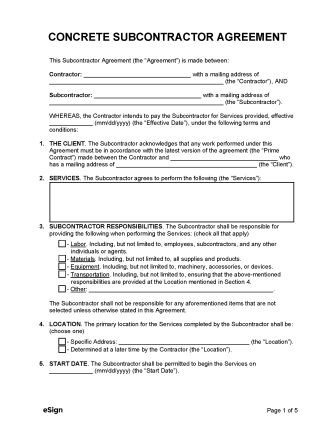

A concrete subcontractor agreement is a document that determines how a subcontractor will perform concrete work for a general contractor. It puts the terms of the professional relationship in writing, ensuring that both parties understand their responsibilities and are protected if problems occur. The agreement specifies when the project begins and ends, what types of concrete and other materials will be used, and how much the contractor will pay. When applicable, the agreement may stipulate that payment shall only be provided when the subcontractor satisfies certain project milestones.
Concrete subcontractor agreements must include each party’s name (or business name) and mailing address. This information is not only helpful for communication and invoicing purposes, but it’s also fundamental to the validity and enforceability of the contract.
A thorough service description lets the parties know what work will and will not be performed by the concrete subcontractor. Services may be added to or removed from the completed agreement via the execution of a “change order.”
The agreement must specify the start and end dates of the contract. By doing so, the subcontractor can more effectively time the acquisition of building permits, manage job site equipment/materials, and schedule employees (if any).
Payment terms explain how the contractor must go about compensating the subcontractor. The terms specify how much the subcontractor charges, how frequently the contractor will make payments, and whether the money will be issued via direct deposit, check, electronic transfer, etc.
This section of the agreement states whether the subcontractor will be required to furnish the construction site with supplies, equipment, labor, or anything else needed to carry out the concrete services.
Dispute resolution procedures determine whether disagreements will be negotiated through a neutral mediator or settled through state-regulated arbitration. Including these procedures in the agreement helps prevent contractual disputes from turning into costly lawsuits.
An insurance protection clause ensures that the subcontractor will bear full responsibility for their actions and the actions of their employees and personnel. Without this clause, the contractor could become liable for service defects, property damage, or other issues stemming from the subcontractor’s work.
Termination provisions indicate whether or not the parties can terminate the agreement before the subcontractor’s work is complete. They also provide details about the amount of written notice required for early contract termination.
A concrete subcontractor is a worker who specializes in designing, installing, finishing, and repairing concrete structures and surfaces. Good concrete subcontractors use their knowledge and experience to execute projects efficiently on behalf of the hiring party, which is usually a general contractor or project manager. Their responsibilities typically include the following: